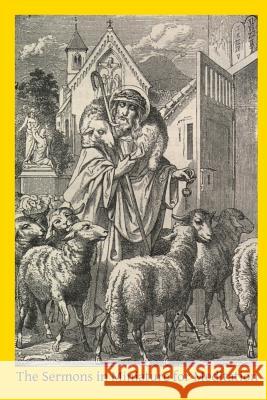The Sermons in Miniature for Meditation » książka
The Sermons in Miniature for Meditation
ISBN-13: 9781518611391 / Angielski / Miękka / 2015 / 242 str.
Meditation is essential to the Catholic Way of life and this work will help accomplish this solemn task: THE parable of the lost sheep is a picture of man's helplessness when separated from God. The. image of a sheep dependent upon its shepherd portrays the deep truth of man's need for God. The sheep out of the fold is a striking type of abject helplessness. Wandering perhaps in quest of richer pasture it loses itself-then the night comes on and the frightened animal gives utterance to its fear with a cry for help. It cannot help itself. It cannot know that with each step it is advancing deeper into the desert. It cannot tell for whom it is bleating. Its instinct urges it to seek the other sheep, whereas in this predicament only the shepherd can be of service. So is it with the history of man's soul. Entangled in the mazes of evil there must come to him a better moment when he knows that of himself he is helpless. He may not realize this at once. He may for a time blindly seek aid from men-as the blind instinct of the lost sheep sought the sheep and not the shepherd -but at last he awakens to the consciousness that when lost in the wilderness there is no relief found in himself or men, hut in God. Now, if man's help is from God alone, man becomes an occasion of God's accidental glory, and in a restricted sense we can say that God needs man. By the divine right of ownership we are the sheep of His fold. He will not-He cannot of His own nature let us perish if we cry for help-no more than the good shepherd could endure the plight of the sheep straying upon the moors. Although the calm, impassable being of God cannot be perturbed, there is in Him, nevertheless, something analogous to the human passions of grief and pity. The feeling of compassion and possession in God is represented in the shepherd seeking out his lost sheep. Man seeks God naturally, but nature having been corrupted, it is difficult for him to direct His mind and will to God. This arises not from malice, but from weakness or thoughtlessness. We are wont to regard the sheep as a type of innocence and stupidity. How often is it true with man that he wanders away from the fold of the Church and the vigilance of the Shepherd, Christ, without malice hut with indifference or ignorance. Not in scorn or rebellion, but in thoughtlessness he has gradually felt himself waxing out of temper withecclesiastical discipline, with the restraint of the moral law and with the requirements of the Sacraments. It was not so with him in the beginning, but he has wandered on and on and alone and a shock has come-he has committed a grave sin and in his weakness and blindness he cries for help. May the Great Shepherd grant us the grace to learn these three lessons from the parable of the lost sheep: first, that we need Him to keep us within the fold; second, that He needs us to keep His fold complete; and third that we need Him when we have strayed away from the fold.
Zawartość książki może nie spełniać oczekiwań – reklamacje nie obejmują treści, która mogła nie być redakcyjnie ani merytorycznie opracowana.











